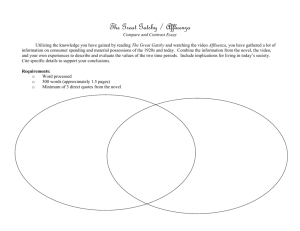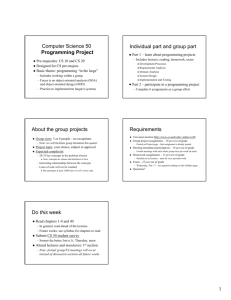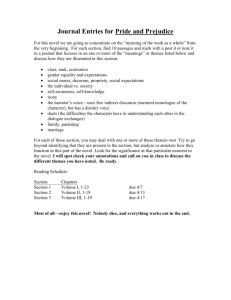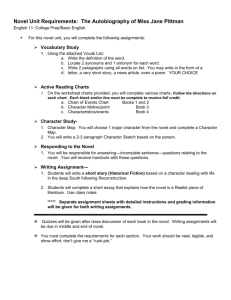Syllabus
advertisement
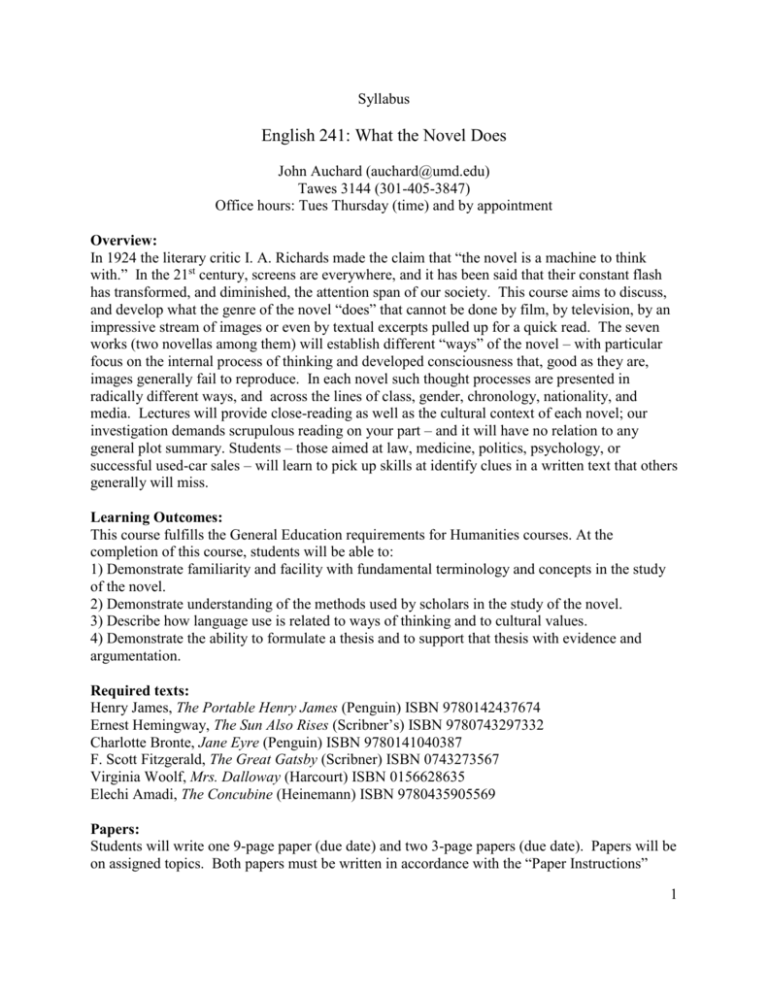
Syllabus English 241: What the Novel Does John Auchard (auchard@umd.edu) Tawes 3144 (301-405-3847) Office hours: Tues Thursday (time) and by appointment Overview: In 1924 the literary critic I. A. Richards made the claim that “the novel is a machine to think with.” In the 21st century, screens are everywhere, and it has been said that their constant flash has transformed, and diminished, the attention span of our society. This course aims to discuss, and develop what the genre of the novel “does” that cannot be done by film, by television, by an impressive stream of images or even by textual excerpts pulled up for a quick read. The seven works (two novellas among them) will establish different “ways” of the novel – with particular focus on the internal process of thinking and developed consciousness that, good as they are, images generally fail to reproduce. In each novel such thought processes are presented in radically different ways, and across the lines of class, gender, chronology, nationality, and media. Lectures will provide close-reading as well as the cultural context of each novel; our investigation demands scrupulous reading on your part – and it will have no relation to any general plot summary. Students – those aimed at law, medicine, politics, psychology, or successful used-car sales – will learn to pick up skills at identify clues in a written text that others generally will miss. Learning Outcomes: This course fulfills the General Education requirements for Humanities courses. At the completion of this course, students will be able to: 1) Demonstrate familiarity and facility with fundamental terminology and concepts in the study of the novel. 2) Demonstrate understanding of the methods used by scholars in the study of the novel. 3) Describe how language use is related to ways of thinking and to cultural values. 4) Demonstrate the ability to formulate a thesis and to support that thesis with evidence and argumentation. Required texts: Henry James, The Portable Henry James (Penguin) ISBN 9780142437674 Ernest Hemingway, The Sun Also Rises (Scribner’s) ISBN 9780743297332 Charlotte Bronte, Jane Eyre (Penguin) ISBN 9780141040387 F. Scott Fitzgerald, The Great Gatsby (Scribner) ISBN 0743273567 Virginia Woolf, Mrs. Dalloway (Harcourt) ISBN 0156628635 Elechi Amadi, The Concubine (Heinemann) ISBN 9780435905569 Papers: Students will write one 9-page paper (due date) and two 3-page papers (due date). Papers will be on assigned topics. Both papers must be written in accordance with the “Paper Instructions” 1 posted on Blackboard as well as all instructions on the individual paper assignments (also posted on Blackboard). Short paper assignments will be available two weeks before each paper is due; the term paper assignment will be available a month in advance. There will be seven reading quizzes (one for each of our works) during discussion section. You may drop your lowest grade (drop the zero is you miss a quiz). All written work must be your own: cases of suspected plagiarism will be sent directly to the Judicial Programs office. Discussion session assignments will be given in discussion sections. TAs will grade all quizzes and papers. If you have questions about your quiz or paper grades, please meet with your TA. If you still have questions, please talk with me. Late papers, late for any reason – plan ahead!! – will be graded down according to the system noted with each assignment. Blackboard (www.elms.umd.edu): All handouts, including the syllabus) and paper assignments will be posted on Blackboard. Each discussion section will have its own Blackboard site, separate from the all-lecture site. As items come up in the news that relate to our class discussion (e.g., a review of the forthcoming 2012 film version of The Great Gatsby, or of the 2011 film Jane Eyre), links will be provided on the Blackboard. Attendance: Although not all midterm and final exam “quotations” will be taken from class discussion (you must read the entire novel to do well on the exams), the vast majority of the exam prompts will come from lecture notes. Students who miss more than one or two classes often decide to drop this class. Attend lectures regularly. Discussion session attendance is mandatory – if you do not attend, you cannot participate, you will be marked off for attendance for that day, and your participation grade will suffer. Evaluation: Final grades will be computed as follows: discussion group participation and discussion group written assignments (i.e., the two short papers) 25%, midterm 20%, term paper, 20%; final 25%. Religious observance: UMCP policy states that students must personally hand their instructor/TA a written notification of the projected absence within two weeks of the start of the semester. Students with disabilities: Please see me and your TA during the first week of the term. Academic integrity: Please comply with the UMCP Honor Code. Please understand that I am a very attentive reader who has an expert ability to catch plagiarism. I will consult with my TAs when they read your assignments – and will frequently make an evaluation of a suspicious paragraph, sentence, or even word. 2 Student evaluations: Please evaluate this course at www.courseevalum.umd.edu. Schedule of Lectures and Assignments [Dates vary each semester.] FIRST LECTURE Introduction: What the novel does and did. FOUR LECTURES Henry James, The Turn of the Screw(in Portable HJ); with remarks on the Freudian Revolution and the human mind FOUR LECTURES Ernest Hemingway, The Sun Also Rises; with remarks on WWI, “the Lost Generation,” and masculine identity FOUR LECTURES Charlotte Bronte, \Jane Eyre; with remarks on nineteenthcentury feminism and pre-Freudian consciousness (SHORT PAPER 1, THE NOVEL AND FILM, Choose Turn of the Screw, Jane Eyre, or The Sun Also Rises) MIDTERM MIDTERM EXAM. FOUR LECTURES F. Scott Fitzgerald, The Great Gatsby; with remarks on the American identity and the American dream of money THREE LECTURES Henry James, Daisy Miller (in Portable HJ); with remarks on the American identity, feminism, and freedom FOUR LECTURES Virginia Woolf, Mrs. Dalloway; with remarks on twentieth-century consciousness, the stream of consciousness, female identity and issues of class (SHORT PAPER II: NOVEL AND FILM CHOOSE: The Great Gatsby, Daisy Miller, or Mrs. Dalloway, i.e., The Hours) FOUR LECTURES Elechi Amadi, The Concubine; with remarks on consciousness and masculinity, and femininity in the precolonial Third World, tradition in West African society; FINAL LECTURE Lecture: “The Mind of the Novel.” (TERM PAPER DUE) FINAL EXAMINATION As scheduled by the University. 3




